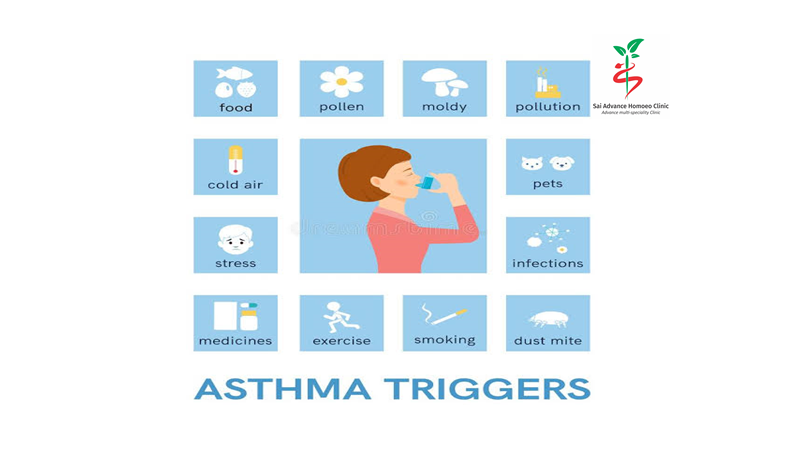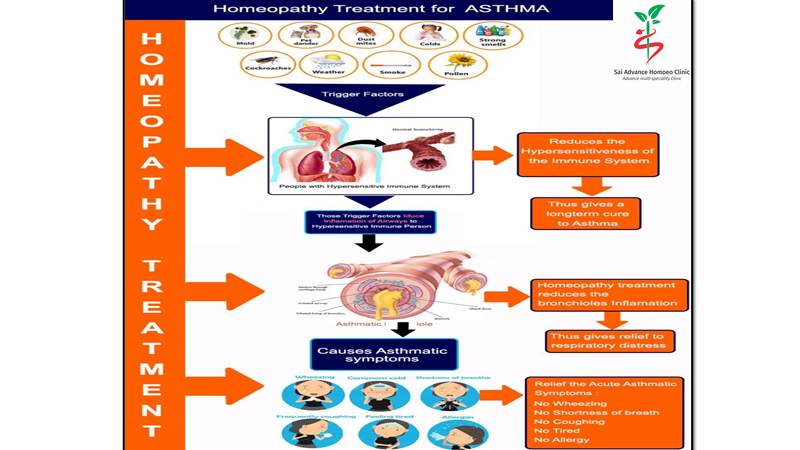Asthma is a inflammatory disease of the airways to the lungs. It makes breathing difficult and can make some physical activities challenging or even impossible.
Asthma symptoms occur when the lining of airways swell and the muscles around them tighten. Mucous then fills the airways, further reducing the amount of air that can pass through.
In asthma the bronchial tubes are inflamed that causes narrowing of the airways. When the airways or bronchial tubes are narrowed, it prevents the free flow of air in the bronchial tubes. The smooth muscles layers surrounding the bronchial tubes are tightened and compress the small bronchioles which causes narrowing of air passages. The narrowing of air passages obstructs the smooth air flow by which the person feels of tightness in chest, shortness of breath and difficulty in breathing .Only some people are getting asthmatic attack and not all because the bronchial tubes of an asthmatic person is overly sensitive to many substances, when exposed to those substances, the bronchial tubes get narrows and create problem for free flow of air in it .It is because of sensitivity to some substances and when get exposed to them start reacting adversity and the mucous membrane of the inner layer of bronchial tube get inflamed and initiate the asthmatic condition /attack.
Our immune system is being exposed by various types of foreign substances like bacteria, viruses, different foreign proteins which recognizes and fights them to throws them out from our body. But in an asthmatic person the immune system is hypersensitive to those substances, which when comes across them starts reacting abnormally. It means the immune system of an asthmatic person reacts adversely to those substances where as the same immune system of a healthy person doesn’t react to them.
Foreign substances like bacteria, viruses ,chemicals, pollutants, dust, pollens, some food proteins which are called as antigen or allergen. Those antigens or allergens when get inside the body our immune system recognizes them and dominates them out our immune cells like T cells ( T lymphocytes) and B cells (B lymphocytes) play the major role to perform this task. A person with hypersensitive immune system when being exposed to those allergens or antigens develops inflammatory reaction in the air passages and develops asthma symptoms .
Causes of Asthma
It is not clear why some people get asthma and other’s don’t, but it’s probably due to a combination of environmental and inherited (genetic) factors.
Asthma tends to runs in families. Genetic play an important role in causing asthma.

Triggering factors of asthma
Exposure to various irritants and substances that trigger allergies(allergens) can trigger signs and symptoms of asthma. Asthma triggers are different from person to person.
Allergies :
Dust,mites, pollen, molds, pet dander, rodents,cockroaches cattle, birds, dogs
Food and food additives
Eggs, cow’s milk, peanuts, tree nuts, soya, wheat, salads, fish, shrimp and other shellfish, fruits. Sulfites and preservatives added to some types of food and beverages, processed potatoes, beer, wine.
Irritants in air
Smoke from cigarette, air pollution such as smog, ozone,wood fires, charcoal grills, strong fumes, vapors, odors ( such as paint, gasoline, perfumes, scented soaps),chemicals.
Respiratory infections
Respiratory infections such as the common cold, flu(influenza),pneumonia, sore throat ,rhinitis, sinusitis.
Medications
Medications such as beta blockers, aspirin and nonsteroidal anti inflammatory drugs such as ibuprofen and naproxen sodium.
GERD
Gastroesophageal reflux disease (GERD),a condition in which stomach acid back up into your throat.
Environmental / Seasonal factors
cold air, thunderstorms, cloudy weather
Occupational exposure
exposure to certain allergens at workplace such as sanitizers, chemical fumes and vapors, strong odors, extreme heat and cold
Health conditions
Certain co-morbid conditions can also compound the symptoms of asthma. These include Constructive sleep apnea, chronic obstructive pulmonary disease (COPD),obesity, pregnancy , Strong emotions and stress
Types of asthma
- Allergic asthma: when the symptoms are induced by hyper immune response to inhalation of specific allergen. Allergic/atopic/extrinsic asthma is triggered by allergens like pollens, pets and dust mites. About 80% of people with allergic asthma have a related condition like hayfever, eczema or food allergies. Allergic asthma may be due to patients occupation (paint, metal, gas).Common allergic substances are cockroaches, pet dander (skin flakes),urine, feces, hair, skin, saliva.
- Non allergic asthma: Non allergic (non atopic/intrinsic)asthma is a type of asthma that isn’t related to an allergy trigger like pollen or dust and is less common than allergic asthma. This type of asthma is triggered by presence of irritants in the air that are not related to allergies. This irritant stimulates parasympathetic nerve fibers in the airways causing broncho-constriction and inflammation.
- Exercise induced asthma: Asthma is triggered by exercise or physical exertion. Coughing and sneezing are the most common symptoms of exercise induced asthma. In this type broncho-constriction (narrowing) and tightening of airways is not caused by having asthma. Exercise induced broncho-constriction mostly affects elite athletes or people doing strenuous exercise in very cold conditions.
- Occupational asthma: Occupational asthma results from exposure to an allergen or irritant present in workplace .Occupational asthma can happen almost any line of work on any work environment, including offices, stores, hospitals and medical facilities, animal breeders,farmers, hairdressers, painters, woodworkers, textile workers, backeris ,flour mills, kitchens, petshop, zoo’s,laboratories, poultry, latex gloves. Extreme change of temperature (hot or cold) at workplace. Adequate ventilation, proper masks,protective clothing and changes in work practices can reduces the risk of developing Occupational asthma.
- Seasonal asthma: Some people have asthma that only flares up at certain times of the year, such as during hayfever season or when it’s cold. In spring season heavy thunderstorms hit on a day with a very high pollen count causes symptoms of an asthma attack. This type of asthma occurs in response to allergens that are only in the surrounding environment at certain time of year e.g.cold in winter, pollen in spring or summer, dust in summer.
- Childhoods asthma: Some children diagnosed with asthma find it improves or disappears completely as they get older. This is known as childhood asthma. It can return later in life, especially if it’s moderate or severe rather than mild. Common triggering factors of childhood asthma are respiratory infections and cold,air pollution both indoor and outdoor, exposure to cold air, excitement, exercise, stress.
- Adult onset asthma: In some people asthma is diagnosed for the first time when they are an adult. This is known as adult onset or late onset asthma. Some of the possible causes of adult asthma are, Occupational exposure to allergens, smoking, obesity, female hormones, stressful life events, respiratory illnesses, allergies and exposure to allergens.
- Nocturnal asthma: In this type symptoms are more prominent at night. The patient may wake up coughing, wheezing or with chest pains Studies shows that most deaths related to asthma occur at night. Sometimes, normal heartburn can trigger asthma symptoms at night.
Risk factors of asthma
A number of factors are thought to increase your chances of developing asthma. They include
- Having blood relatives with asthma, such as parent or sibling
- Having another allergic condition, such as atopic dermatitis or hayfever
- Being overweight
- Being smoker
- Exposure to secondhand smoke
- Exposure to exhaust fumes or other types of pollution
- Exposure to occupational triggers, such as chemicals used in farming, hairdressing and manufacturing
- Mother smoking during pregnancy appears to increase the risk of fetus developing asthma in later life
- Being born prematurely (before 37 wks.)or with a low birth weight
Symptoms of asthma

- Coughing especially at night, when laughing or during exercise
- Tightness, pressure, pain in the chest
- Shortness of breath
- Difficulty in talking
- Anxious or panic
- Fatigue
- Trouble sleeping because of breathing problems
- Pale, sweaty face
- Blue lips or fingernails
Not everyone with asthma will experience these particular symptoms. The type of asthma that patient having determine the symptoms which patient experience
Complications of Asthma
Asthma complications include,
- Signs and symptoms that interfere with sleep, work and activities
- Sick days from work or school during asthma flare up
- A permanent narrowing of the tubes that carry air to and from your lungs (bronchial tubes)which affects how well you can breathe.
- Hypotension
- Shock and respiratory failure
- Atelectasis and plural effusion (fluid around the lung)
- Super infection
- Empyema(pus in plural cavity)
- Hyponatremia (low blood sodium)
Homoeopathic treatment and management of Asthma

Asthma is a chronic, recurring disease which requires long term homoeopathic management with those medicines which give you no side effects and which should not cause dependency.
In homoeopathic mode of treatment the goal is to treat asthma with minimal dose. This dose is chosen based on symptom similarity of the drug to that of patient having asthma. The medicine treats the root cause of illness by triggering the body’s defenses to reduce the inflammatory process ,thereby giving complete wellness.
There are many homoeopathic medicines when selected as per totally of the symptoms of the person can able to control acute asthma symptoms effectively and rapidly. The medicines for acute symptoms can be given repeatedly over 30 minutes to hour interval till the symptoms are not getting fully recovered. A proper selected homoeopathic medicine basing upon the homoeopathic way of history taking which covers the common clinical symptoms mental general symptoms, miasmatic background, family history, past history of any disease. If that medicine is given for considerable time it will help to modify the hypersensitive immune system to normal functioning immune system.

Preventive measures to treat and control asthma
In spite of proper homoeopathic treatment there are many factors those also put bad impact on the immune system and convert its healthy functioning nature to hypersensitive nature. Factors that affect the immune system are faulty lifestyle, faulty food habits, lack of physical activities, constantly staying in a overstressed condition, side effects of various chemical drugs, obesity, smoking, rise of pollution, suppression of any skin disease, hereditary condition and so many life style changes also responsible for making our immune system hyperactive. So with homoeopathic treatment a healthy lifestyle, healthy habits, healthy mind set up is mostly desirable to cure asthma permanently.
